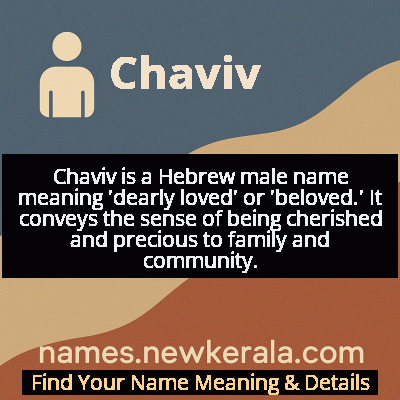Chaviv Name Meaning & Details
Origin, Popularity, Numerology Analysis & Name Meaning of Chaviv
Discover the origin, meaning, and cultural significance of the name CHAVIV. Delve into its historical roots and explore the lasting impact it has had on communities and traditions.
Name
Chaviv
Gender
Male
Origin
Hebrew
Lucky Number
2
Meaning of the Name - Chaviv
Chaviv is a Hebrew male name meaning 'dearly loved' or 'beloved.' It conveys the sense of being cherished and precious to family and community.
Chaviv - Complete Numerology Analysis
Your Numerology Number
Based on Pythagorean Numerology System
Ruling Planet
Moon
Positive Nature
Diplomatic, friendly, artistic, empathetic.
Negative Traits
Over-sensitive, moody, indecisive, prone to self-pity.
Lucky Colours
Green, cream, white.
Lucky Days
Monday.
Lucky Stones
Pearl, moonstone.
Harmony Numbers
1, 3, 4.
Best Suited Professions
Diplomats, mediators, caregivers, artists.
What People Like About You
Cooperative spirit, friendliness, artistic talent.
Famous People Named Chaviv
Chaviv Kanaan
Military Commander
Israeli military officer known for his leadership during Israel's early statehood period
Chaviv Shimmel
Rabbi and Scholar
Prominent Jewish educator and community leader in the United States
Chaviv Levy
Business Leader
Israeli entrepreneur and philanthropist in technology sector
Name Variations & International Equivalents
Click on blue names to explore their detailed meanings. Gray names with will be available soon.
Cultural & Historical Significance
Throughout Jewish history, the name has been given to express the precious nature of a child, particularly in families that have experienced hardship or loss, symbolizing the child's role as a source of joy and comfort. In modern Israeli culture, the name maintains its traditional meaning while also representing connection to Hebrew linguistic roots and Jewish heritage, serving as a bridge between ancient traditions and contemporary identity.
Extended Personality Analysis
Individuals named Chaviv are often perceived as warm, affectionate, and deeply connected to their relationships. They tend to be people-oriented, valuing family bonds and close friendships above material possessions. Their inherent warmth makes them naturally charismatic and well-liked in social circles. Chavivs typically exhibit strong emotional intelligence, able to understand and respond to others' feelings with genuine care and compassion.
They often become the emotional anchors in their families and communities, known for their loyalty and steadfast support of loved ones. While generally gentle-natured, they can display remarkable strength when defending those they care about, showing that their loving nature is complemented by protective instincts. This combination of warmth and strength makes them particularly effective in caregiving roles and positions requiring both empathy and resilience.
Modern Usage & Popularity
In contemporary times, Chaviv remains a meaningful choice primarily within Jewish and Israeli communities, though it's not among the most common Hebrew names. Its usage has seen modest growth in recent years as parents seek traditional Hebrew names with beautiful meanings that aren't overly common. The name is particularly popular among families wanting to honor heritage while choosing something distinctive that carries deep emotional significance. In Israel, it maintains steady but selective usage, often chosen by parents who value the name's emotional depth and traditional roots over current naming trends.
Symbolic & Spiritual Meanings
Symbolically, Chaviv represents the concept of cherished love and precious relationships, embodying the idea that true value lies in emotional connections rather than material wealth. The name carries connotations of warmth, protection, and enduring affection, symbolizing the human capacity for deep, meaningful bonds that transcend superficial relationships. Metaphorically, it suggests someone who is a treasure in others' lives - not just loved, but essential to the emotional well-being of their community, representing the Jewish value of placing family and relationships at the center of meaningful existence.

